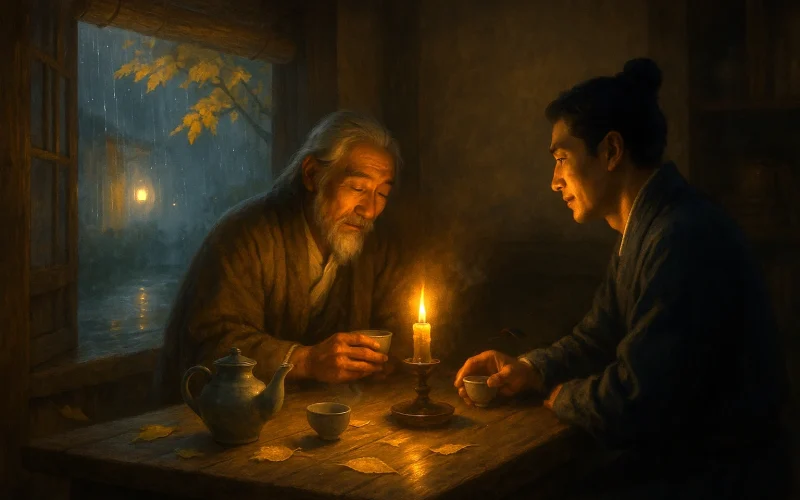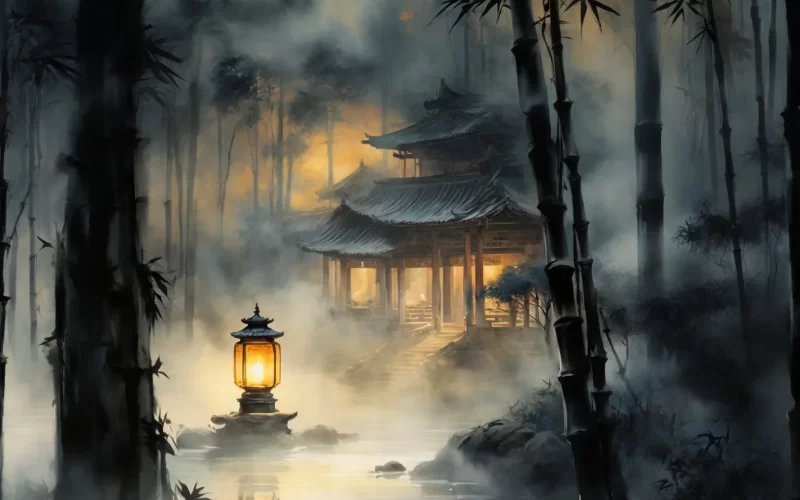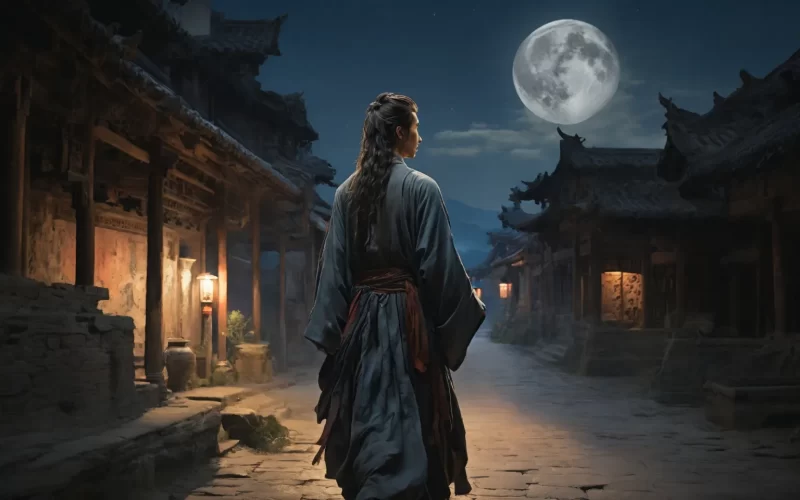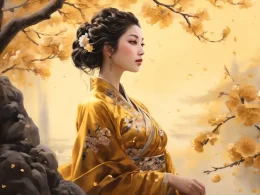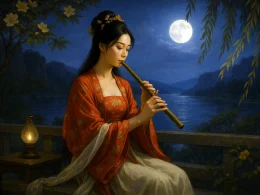With no other neighbour but the quiet night,
Here I live in the same old cottage;
And as raindrops brighten yellow leaves,
The lamp illumines my white head.
Out of the world these many years,
I am ashamed to receive you here.
But you cannot come too often,
More than brother, lifelong friend.
Original Poem
「喜外弟卢纶见宿」
司空曙
静夜四无邻,荒居旧业贫。
雨中黄叶树,灯下白头人。
以我独沉久,愧君相访频。
平生自有分,况是蔡家亲!
Interpretation
This poem was composed during Sikong Shu's period of political frustration and financial hardship. According to "Biographies of Tang Talents," Sikong Shu possessed "unconventional brilliance" but remained "upright and unwilling to flatter the powerful," resulting in lifelong career struggles. The work captures his emotional state when his cousin Lu Lun unexpectedly visited him during his impoverished seclusion. It juxtaposes the desolation of a rainy night in a remote village with the warmth of kinship, revealing the poet's emotional transition from sorrow to joy.
First Couplet: "静夜四无邻,荒居旧业贫。"
Jìng yè sì wú lín, huāng jū jiù yè pín.
"Silent night—no neighbors around; Deserted dwelling—old pursuits run aground."
The opening establishes loneliness and poverty—the absence of neighbors and decline of family fortunes create a somber mood that foreshadows the emotional progression.
Second Couplet: "雨中黄叶树,灯下白头人。"
Yǔ zhōng huáng yè shù, dēng xià bái tóu rén.
"Rain-drenched trees shed yellow leaves; Beneath the lamp, a white-haired man grieves."
This couplet paints a poignant scene: autumn rain, falling leaves, dim lamplight, and gray hair collectively convey desolation and aging. The imagery blends movement and stillness, emotion and scenery with remarkable power.
Third Couplet: "以我独沉久,愧君相访频。"
Yǐ wǒ dú chén jiǔ, kuì jūn xiāng fǎng pín.
"Long submerged in solitude, I; Feel ashamed you visit frequently."
Transitioning from personal hardship to familial warmth, the poet expresses both gratitude and embarrassment at his cousin's repeated visits—a profoundly moving emotional complexity.
Fourth Couplet: "平生自有分,况是蔡家亲!"
Píng shēng zì yǒu fèn, kuàng shì Cài jiā qīn!
"Lifelong bonds naturally exist; How much more our Cai-family kinship!"
The conclusion transcends formalities to affirm blood-deep connection. The reference to "Cai-family" (an literary allusion to close kinship) underscores the unconditional comfort of family ties during adversity.
Holistic Appreciation
The poem's structure masterfully contrasts isolation and companionship. The first half depicts solitary suffering—aging, poverty, and rainy-night loneliness—while the second half shifts to the joy of familial visit. Lu Lun's arrival brings not just material comfort but spiritual solace, particularly through the iconic couplet comparing yellow leaves to white hair, where natural decay mirrors human mortality. This bittersweet interplay between sorrow and warmth creates rich emotional layers.
Artistic Merits
- Structural Counterpoint: The clear contrast between desolation and kinship follows classical "reversal-complementation" (反正相生) technique, as noted by critic Yu Biyun.
- Symbolic Juxtaposition: The "yellow leaves/white hair" parallel employs natural metaphor (比兴) to embody life's transience.
- Authentic Simplicity: Unadorned language conveys profound sincerity, transforming shame into emotional depth.
Insights
This poem depicts a nighttime visit from relatives and friends in ordinary life, conveying the warmth of familial comfort during life's low points. Despite his hardships, the poet does not complain about fate but instead expresses gratitude for kinship and cherishes the sincere connections between people. It inspires us that on life's lonely path, genuine affection is the true warmth—even in the most difficult circumstances, as long as kindness and gratitude remain in one's heart, there will always be light to rely on.
Poem translator
Kiang Kanghu
About the poet
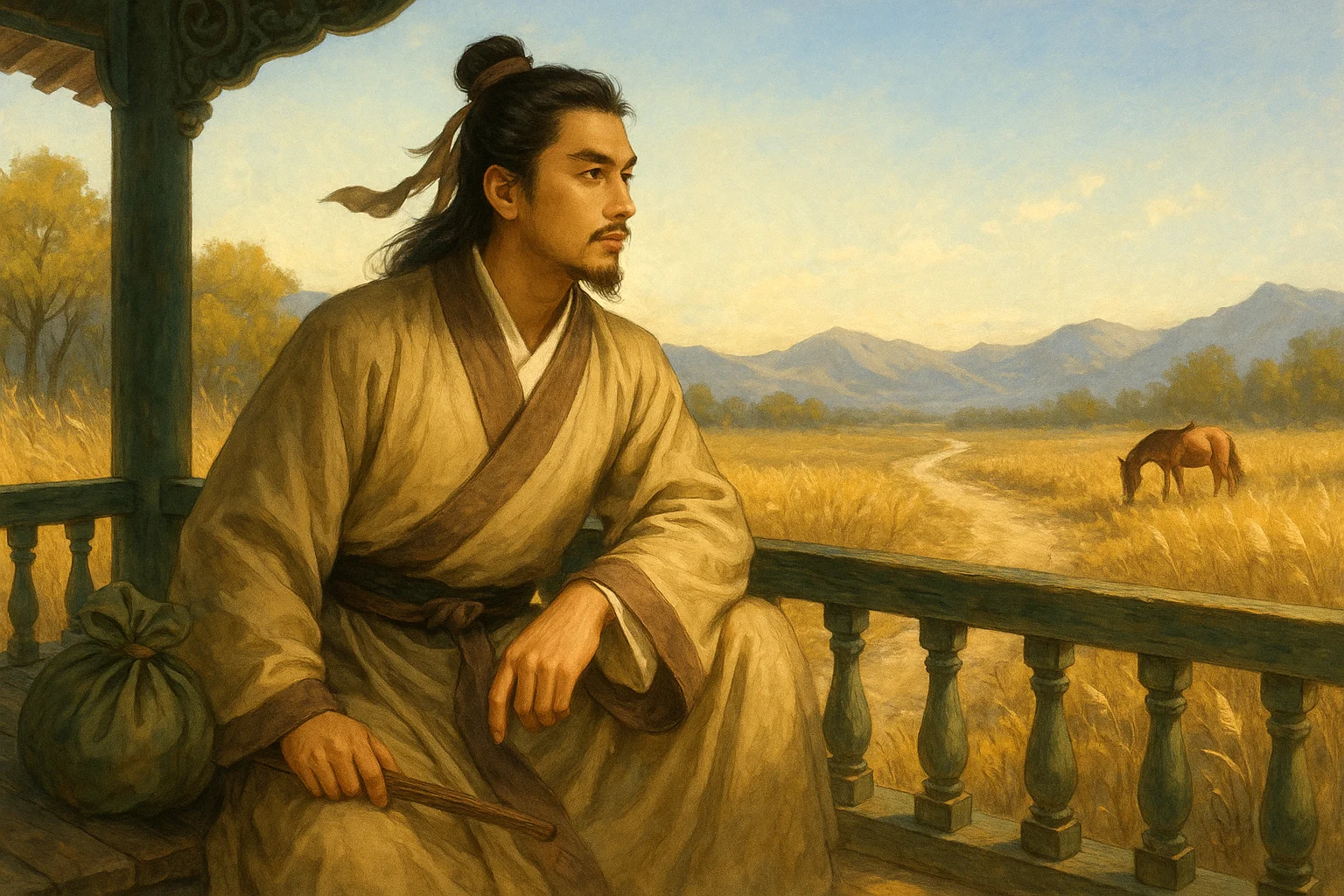
Sikong Shu (司空曙), c. 720 – c. 790, courtesy name Wenming, was a native of Guangping (present-day Yongnian County, Hebei Province). A renowned mid-Tang dynasty poet, he was one of the "Ten Literary Masters of the Dali Era," alongside Lu Lun, Qian Qi, Han Hong, Li Duan, and others. Though his life lacked illustrious achievements, his poetry—marked by genuine emotion in simplicity and profound contemplation in solitude—secured him a unique place in mid-Tang literary circles.






